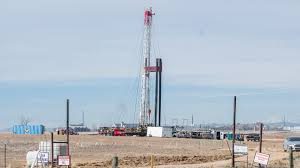
Severance taxes from oil and gas are a major issue in Colorado as state leaders reassess the state’s crumbling fiscal picture. Some observers wonder if a tax break for the industry could grow so large that many Colorado oil wells will owe nothing in severance taxes.
Consider it the $308 million elephant in the room according to the Colorado Sun.
That’s how much Colorado gave back to the oil and gas industry in 2018 through one of the state’s largest tax breaks, the ad valorem tax credit. It’s only expected to grow in the coming years, depleting the state’s coffers at the time it needs money the most.
That uncertain backdrop has injected new urgency — and new complications — into conversations that lawmakers have quietly been having for months. Top lawmakers told The Colorado Sun that they plan to convene a study committee this summer to scrutinize the taxes the fossil fuel industry pays — as well as the ones it doesn’t.
A recent nonpartisan legislative analysis released found that the industry pays the second lowest severance tax rate of nine Western oil-producing states, and the third lowest rate when factoring other state and local taxes. Most states impose severance taxes on minerals extracted from the earth, like coal, metals and oil and gas, in part to compensate communities for the loss of these resources. Colorado’s severance tax revenues are split between local governments and the Department of Natural Resources.
This week, lawmakers learned that severance tax collections are now projected to drop to $133 million this year, from $242 million in the 2019 fiscal year. The Legislative Council economic forecast says fossil fuel severance tax revenues could plummet even further, to $37 million next year. Because of a lag, the industry won’t get the massive tax credit owed from the 2019 production boom until 2021, even as production slows amid the one-two punch of coronavirus and an international price war. The declining revenues are part of the broader economic hit to the state budget from the current COVID-19 pandemic that is now projected to leave a hole in next year’s spending plan and prompting an 11th hour rewrite.
Democrats and Republicans believe a study is warranted, but finding common ground may prove difficult to find — and new tax dollars even harder. Even in the best of times, an overhaul of severance taxes is a contentious political fight with one of the state’s largest industries.
The industry is hemorrhaging at the moment. Oil prices dropped 24% in a single day earlier this month amid growing hostilities between Russia and Saudi Arabia, and worldwide demand has followed prices downward as much of the industrialized world stops driving and flying during a pandemic. Closing below $24 a barrel Friday, oil prices are now well under the industry’s “breakeven” point of around $50 for new wells and short of what it costs to keep existing operations running profitably, according to the Federal Reserve Bank of Dallas.
As a result, lawmakers in both parties say the state’s immediate budget problems can’t be addressed through higher taxes on the industry. “I don’t think there’s any blood to get out of that turnip,” said Sen. Bob Rankin, a Carbondale Republican who serves on the budget writing committee and is among those calling for a severance tax study.
Looming in the background of the financial discussion is a question that policymakers for years have avoided asking directly: Why is a state that’s committed to ambitious reductions in carbon dioxide emissions simultaneously subsidizing the fossil fuels that produce most of them?
Source: Colorado Sun





